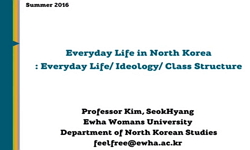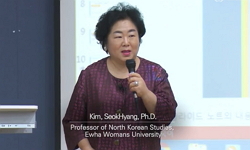본 논문의 목적은 탈냉전시대 한국의 대북정책과 남북관계의 변화를 양자의 상관성 맥락에서 분석하는 것이다. 남북관계에 미치는 영향요인은 다차원적이다. 그러나 대북정책은 남북관계...
http://chineseinput.net/에서 pinyin(병음)방식으로 중국어를 변환할 수 있습니다.
변환된 중국어를 복사하여 사용하시면 됩니다.
- 中文 을 입력하시려면 zhongwen을 입력하시고 space를누르시면됩니다.
- 北京 을 입력하시려면 beijing을 입력하시고 space를 누르시면 됩니다.
https://www.riss.kr/link?id=A109350182
- 저자
- 발행기관
- 학술지명
- 권호사항
-
발행연도
2005
-
작성언어
-
-
주제어
한국 정부 ; 대북정책 ; 남북관계 ; 남북경협 ; 평화공존 ; South Korea ; North Korea ; inter-Korean relations ; economic cooperation ; peaceful coexistence
-
KDC
349
-
등재정보
KCI등재
-
자료형태
학술저널
-
수록면
203-230(28쪽)
- 제공처
-
0
상세조회 -
0
다운로드
부가정보
국문 초록 (Abstract)
본 논문의 목적은 탈냉전시대 한국의 대북정책과 남북관계의 변화를 양자의 상관성 맥락에서 분석하는 것이다. 남북관계에 미치는 영향요인은 다차원적이다. 그러나 대북정책은 남북관계의 개선을 중간 목표로 상정하고 있다는 점에서 가장 직접적인 변수로 작용한다. 단기적으로 한국의 대북정책과 무관하게 남북관계의 변화 양상이 나타나기도 한다. 그러나 중장기적으로 한국의 대북정책은 여러 가지 국내외 영향 변수를 고려한 결과로서 산출되며, 그에 따른 정책 추진의 결과는 북한의 대남정책에 영향을 미쳐 남북관계의 변화를 가져온다. 한국의 대북정책과 남북관계 간의 정(正)의 상관관계를 안정화시키는 정책과제로는 남북간 직접적인 군사협상의 추진과 한반도 평화공존 체제의 구축, 남북경제의 상호 의존성 제고, 남한 사회 내에서의 대북정책 컨센서스 구축, 대북정책의 국제적 협력 환경조성 등이 제시되었다. 남북관계가 특정한 요인에 구애받지 않는 지속 가능한 관계로 발전시키는 대북정책은 남북한 평화공존의 기반이 된다.
다국어 초록 (Multilingual Abstract)
This article intends to analyze South Korea s policy towards North Korea and changes in inter-Korean relations in the post-cold war era, in the context of correlations between those two factors. The factors which have an impact on inter-Korean relatio...
This article intends to analyze South Korea s policy towards North Korea and changes in inter-Korean relations in the post-cold war era, in the context of correlations between those two factors. The factors which have an impact on inter-Korean relations are multi-dimensional. But, South Korea s North Korea policy is considered to be a most direct cause in the sense that it aims to improve inter-Korean relations. In the short term, there may emerge some changes in inter-Korean relations regardless of the South s policy towards the North. In the longer term, however, South Korea s North Korea policy is a product of the mixture of many internal and external factors, and the implementation of the policy influences North Korea s policy towards South Korea which in turn leads to certain changes in inter-Korean relations. This paper proposes several policy suggestions in order to continue to develop and stabilize the positive relationship between South Korea s North Korea policy and inter-Korean relations: first, South and North Korea should start direct military talks and establish a peaceful coexistence system; second, South Korea should enhance its efforts to raise inter-Korean economic dependence; third, the South Korean government should be more attentive to national consensus building with regard to its policy towards North Korea; fourth, South Korea needs to conduct a multi-faceted diplomacy to form an international environment favorable to the implementation of its policy towards North Korea.
목차 (Table of Contents)
- Ⅰ. 머리말
- Ⅱ. 한국의 대북정책과 남북관계의 상관성
- Ⅲ. 민간정부 등장 이후 한국의 대북정책: 비판적 분석
- Ⅳ. 남북관계의 변화
- Ⅴ. 평가와 향후 과제
- Ⅰ. 머리말
- Ⅱ. 한국의 대북정책과 남북관계의 상관성
- Ⅲ. 민간정부 등장 이후 한국의 대북정책: 비판적 분석
- Ⅳ. 남북관계의 변화
- Ⅴ. 평가와 향후 과제
- Ⅵ. 결론
동일학술지(권/호) 다른 논문
-
The Nordpolitik as President Rho Tae Woo s New Foreign Policy, 1988-1992
- 한국세계지역학회
- 김용직(Yong-Jick Kim)
- 2005
- KCI등재
-
- 한국세계지역학회
- 황호선(Hwang Hoseon)
- 2005
- KCI등재
-
- 한국세계지역학회
- 조현석(Hyun-Suk Cho)
- 2005
- KCI등재
-
- 한국세계지역학회
- 김혁(Hyok Kim)
- 2005
- KCI등재





 KCI
KCI 스콜라
스콜라






